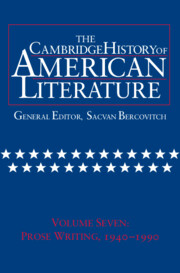Book contents
- Frontmatter
- Introduction
- The Drama, 1940—1990
- Fiction and Society, 1940–1970
- After the Southern Renascence
- Postmodern Fictions, 1960–1990
- 1 Rethinking Postmodernism
- 2 Fables of the Fetish
- 3 The End of Traditionalism
- 4 Women’s Fiction: The Rewriting of History
- 5 Conclusion
- Emergent Literatures
- Appendix: Biographies
- Chronology, 1940–1990
- Bibliography
- Index
5 - Conclusion
from Postmodern Fictions, 1960–1990
Published online by Cambridge University Press: 28 March 2008
- Frontmatter
- Introduction
- The Drama, 1940—1990
- Fiction and Society, 1940–1970
- After the Southern Renascence
- Postmodern Fictions, 1960–1990
- 1 Rethinking Postmodernism
- 2 Fables of the Fetish
- 3 The End of Traditionalism
- 4 Women’s Fiction: The Rewriting of History
- 5 Conclusion
- Emergent Literatures
- Appendix: Biographies
- Chronology, 1940–1990
- Bibliography
- Index
Summary
This study has described some of the remarkable changes in American fiction since the late 1960s. At that time, the novel displayed three main tendencies. The one considered most artistically important then was the playful experimentation of John Barth and Thomas Pynchon, which struck critics as such a departure from the past that it was labeled “postmodern.” Now, at the end of the century, its connections to such high modernists as James Joyce and Franz Kafka seem obvious, so that this experimental wing of “postmodernism” may not quite merit its prefix. In contrast to the experimentalists, such authors as Norman Mailer and Philip Roth were producing a story- and character-centered literature that seemed to have more in common with nineteenth-century realism than the twentieth-century avant garde. The third category in the trio was just emerging as a literary entity: women’s fiction. Its aim was to rewrite history so as to recast the importance of women in all areas of life, and it was defined not in terms of literary affinities or differences (traditionalism, experimentalism) but in terms of the gender of its authors.
Though the work of other groups - blacks, gays, Native Americans -was being published in the late 1960s, it was usually not identified as such. Scholars had not yet elaborated the historical and theoretical context that would create a separate identity for such works, and in the late 1960s, many critics were acutely uncomfortable with typologies determined by ethnicity and gender. Thus the work of the black novelist Ishmael Reed was treated as experimentalism and that of the gay author Edmund White was seen as realism.
- Type
- Chapter
- Information
- The Cambridge History of American Literature , pp. 528 - 538Publisher: Cambridge University PressPrint publication year: 1999



